I’m finally escaping “the Abyss of April.” This month on the college academic calendar is CRAZY. You start the month believing that Spring Break will help you catch up on the numerous projects on your plate, only to face the fact that at the end of that sacred week away from teaching you are still behind. Classes start back up and you realize there is now less than two months before finals and graduation!! For professors this usually means that we have another set of midterms and/or papers we need to collect and grade, student projects to oversee, and the inevitable reality that you over-assigned readings and topics that you still hope you will finish. During this time, we also find ourselves advising –helping continuing students select classes and stay on course to graduate, and the life advising for graduating seniors (which I’ll get back to.) Compounding this –April is admissions recruitment month where we are inundated with events related to recruiting next year’s incoming classes –so add to the calendar dinners, lunches, and coffees. Oh did I forget to mention that every organization, academic and student affair unit has also scheduled some sort of event that they’d like you to attend. I can’t tell you how many times I’ve double scheduled myself –only to be saved from offending my students or colleagues by the fact that I teach evening classes. (translation,: I rsvp’d yes to an event I never could have attended–that’s how busy it’s been). Yes –negotiating the Abyss of April requires a firm hold on the little bit of sanity you have left at the end of the school year. Don’t get me wrong, I love my job and my students –but sometimes you just want to slow down, take a breathe, and savor the moment –particularly when you feel like time is flying by.
This May marks the end of my fourth year at the University of San Diego, and over the last few weeks I’ve come to the bittersweet realization that this year’s graduating seniors that I advise (formally and informally) are the first group I’ve traveled the academic cycle with –they started with me at USD and are now moving on to get jobs in ‘the real world’ we’ve ‘prepared’ them for over the past 4 years. This group of students survived my transition into teaching (which wasn’t always pretty), some started the Sociology Major in my Introduction to Sociology, almost every single one of them was tortured/taught Research Methods from me. These students taught me the USD culture, which included: dedication to philanthropy and community service, redefining the terms ‘academic drive,”commitment,” “ambition” and “excellence.” I learned Thursday nights redefined my understanding of ‘club attire’ and that Coachella is a university holiday. I learned the importance of waiver forms when you ask students to do observations on the San Diego trolley (thank goodness my softball player students didn’t have to beat up the man who decided to inappropriately flash them.) I learned the delicate balance between tough love and student support. I’ve witnessed my students’ great capacity to love, and their ability to redefine what resilience and perseverance means. Maybe more than anything else, this group makes me laugh until I’m ready to cry or fall out of my chair –they gifted me with the kind of laughter that heals and sustains the soul.
I’ve watched them grow from 18 year old, wide-eyed fresh persons into the young men and women set to conquer the world. Over the course of the last few weeks, I’ve learned that my students are set to start post-baccalaureate programs to prepare for health careers, are enrolling in Masters or PhD programs. Some will work for Teach for America, the Jesuit Volunteer Corps, or the Peace Corps. Other students are heading to international locations to work for non governmental organizations (NGO’s) on HIV/AIDS prevention, sustainability, or education. While I’ve graduated a lot of really phenomenal and amazing students before –this year is different.
Now as my mind clears from the Abyss of April, I realize what makes this moment special is that that I’ve traveled a parallel road with this year’s seniors and grown up quite a bit too. While I will savor the next five weeks, I know that as they continue on their life’s path –they will do nothing short of amazing things. So, before life speeds up, and time flies by, I’m stopping for a moment to thank each of them for helping me improve, change, and grow.




